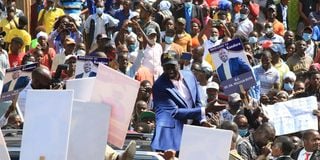Premium
Covid-19: How political rallies are fuelling surge in infections

Deputy President William Ruto interacts with his supporters at Kenol town in Murang’a County during a visit on October 4, 2020.
What you need to know:
- Kisumu County, which hosted President Kenyatta and ODM leader Raila Odinga and their teams has seen the Covid-19 numbers grow from 882 to 1,212.
- Kisii County, where Mashujaa Day celebrations were held, reported a surge in new cases from 512 to 614.
Counties that have hosted crowded political rallies without regard to Covid-19 health protocols have reported a disproportionately sharp increase in new infections compared to the less politically active ones, a Nation analysis has revealed.
A review of five counties that hosted huge political rallies reported 733 new Covid-19 cases in just 10 days after the events in which politicians addressed masses with no enforcement of social distancing and face mask requirements.
By contrast, five randomly selected counties that did not host any mass gatherings reported only 151 new Covid-19 cases in the same period.
Kakamega, Kisii, Nyeri, Embu, and Kisumu counties, where politicians have held packed rallies since October 20 with little regard for social distancing and few people wearing face masks have collectively recorded a surge in Covid-19 infections from 2,153 cases to more than 2,886 as at yesterday.
Kisumu County, which hosted President Kenyatta and ODM leader Raila Odinga and their teams has seen the Covid-19 numbers grow from 882 to 1,212. Kisii County, where Mashujaa Day celebrations were held, reported a surge in new cases from 512 to 614.
Embu County, which hosted Deputy President William Ruto’s entourage, recorded an increase from 215 cases late last month to the current 248 infections. The same goes for Nyeri, which had 326 Covid-19 cases before hosting rallies by the President and his deputy on separate occasions; after which the numbers increased to 381.
Kakamega County, which has in the past three days witnessed the deaths of county chief of staff Robert Sumbi, gubernatorial candidate in the 2017 election Mable Muruli and Dr Daniel Alushula, a surgeon at the referral hospital, has recorded a surge in Covid-19 cases in less than two weeks.
The county, which hosted the DP and his allies during the period, had 218 cases on October 20 but they increased to 404 by the end of the month.
The Nation picked a sample of five randomly selected counties where there have been no mass political rallies, which together reported only 151 new Covid-19 cases. Wajir, West Pokot, Kwale, Makueni and Vihiga recorded 416 cases since Mashujaa day and 567 cases on the last day of October.
As the number of cases in the five counties that hosted rallies continues to rise, Nairobi and Mombasa, which have been the epicentre of the virus, have recorded a sharp rise, with the capital city’s numbers increasing to 25,977 cases from 22,581. Mombasa, on the other hand, has reported a total of 4,492 infections from 3,589 cases on Mashujaa day.
The rising political temperatures caused by the Building Bridges Initiative (BBI) constitutional reforms duel between the two political camps led by President Kenyatta and his deputy seem to be fuelling the surge, with experts raising concerns over what has come to be described as super-spreader rallies.
Public gatherings
Health Cabinet Secretary Mutahi Kagwe has previously condemned politicians for holding rallies despite the surging Covid-19 numbers, terming their actions irresponsible. “Public gatherings seem to have resumed in total disregard of guidelines issued by the ministry. If leaders don’t observe the measures, then they send a signal to the public that all is well,” he said at a recent media briefing.
Dr Andrew Suleh, a former Kenya Medical Association (KMA) chairman and renal specialist said in an interview that the public is used by politicians for their selfish gains.
“The public is used to lies and politicians are attracting them with lies, propaganda and money for their benefit. It is unfortunate that as politicians ignore health protocols and guidelines, the public and health workers suffer the brunt of their recklessness,” he said.
Dr Suleh said messaging from various ministries has left many Kenyans confused; and some do not believe in the numbers announced by the Ministry of Health.
“It starts with the messaging and so when you have the Ministry of Education contradicting its health counterpart by insisting that it is okay to send children back to school yet the latter insists that we are on the second wave, then the public believes there is no virus and that is why you see hundreds of people attending the said rallies,” he said.
The surge in numbers, with little concern shown by the politicians, has led some to believe that Kenya could be conducting a herd immunity test just like the neighbouring Tanzania.
Health Chief Administrative Secretary Rashid Aman, however, dismissed the claim and said the government would not risk the lives of Kenyans to experiment whether herd immunity works.
He explained that such an approach could lead to a catastrophic loss of human lives without necessarily speeding up a return to normalcy.
Infectious diseases.
Herd immunity occurs when a large portion of a community (the herd) becomes immune to a disease, making person to person spread of infection unlikely.
As a result, the whole community becomes protected — not just those who are immune.
But Prof Lukoye Atwoli, the dean of the Aga Khan University Hospital Medical College, said on his Twitter page that the idea of herd immunity is not viable and makes no sense when it comes to infectious diseases.
“For anyone singing the ‘herd immunity’ song on Covid-19, pause a little. The science is still evolving. But no infectious disease has ever been eradicated by ‘herd immunity’ without a vaccine. Also, I know several colleagues and friends who have been infected twice in three months,” he said.





